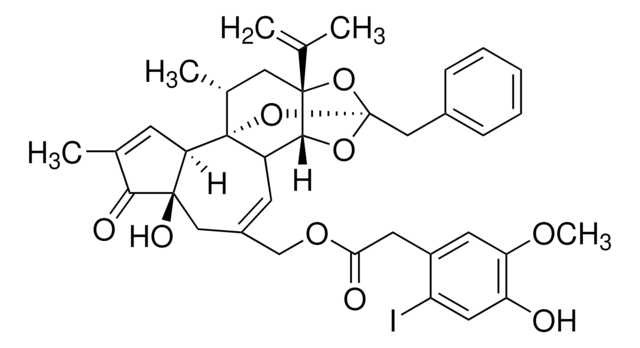L9504
D-Luciferin
luminescent, ≥98% (HPLC), powder
Synonym(s):
(S)-2-(6-Hydroxy-2-benzothiazolyl)-2-thiazoline-4-carboxylic acid, 4,5-Dihydro-2-(6-hydroxy-2-benzothiazolyl)-4-thiazolecarboxylic acid, Firefly Luciferin
About This Item
Recommended Products
product name
D-Luciferin, synthetic
biological source
synthetic
Assay
≥98% (HPLC)
form
powder
solubility
DMSO: 10 mg/mL, clear, colorless to faintly yellow
fluorescence
λex 328 nm; λem 532 nm in H2O
storage temp.
−20°C
SMILES string
OC(=O)[C@H]1CSC(=N1)c2nc3ccc(O)cc3s2
InChI
1S/C11H8N2O3S2/c14-5-1-2-6-8(3-5)18-10(12-6)9-13-7(4-17-9)11(15)16/h1-3,7,14H,4H2,(H,15,16)/t7-/m1/s1
InChI key
BJGNCJDXODQBOB-SSDOTTSWSA-N
Looking for similar products? Visit Product Comparison Guide
General description
Application
Biochem/physiol Actions
Application
replaced by
Storage Class Code
11 - Combustible Solids
WGK
WGK 3
Flash Point(F)
Not applicable
Flash Point(C)
Not applicable
Personal Protective Equipment
Certificates of Analysis (COA)
Search for Certificates of Analysis (COA) by entering the products Lot/Batch Number. Lot and Batch Numbers can be found on a product’s label following the words ‘Lot’ or ‘Batch’.
Already Own This Product?
Find documentation for the products that you have recently purchased in the Document Library.
Customers Also Viewed
Articles
Bioluminescence imaging (BLI) systems allows for high-sensitive and noninvasive monitoring of cell proliferation, activity of signaling pathways and protein-protein interactions in living tissues.
seMpai substrate is suitable for near-infrared BLI in biological experiments, offering high solubility for extended bioluminescent applications.
seMpai substrate is suitable for near-infrared BLI in biological experiments, offering high solubility for extended bioluminescent applications.
seMpai substrate is suitable for near-infrared BLI in biological experiments, offering high solubility for extended bioluminescent applications.
Chromatograms
application for HPLCapplication for HPLCOur team of scientists has experience in all areas of research including Life Science, Material Science, Chemical Synthesis, Chromatography, Analytical and many others.
Contact Technical Service








